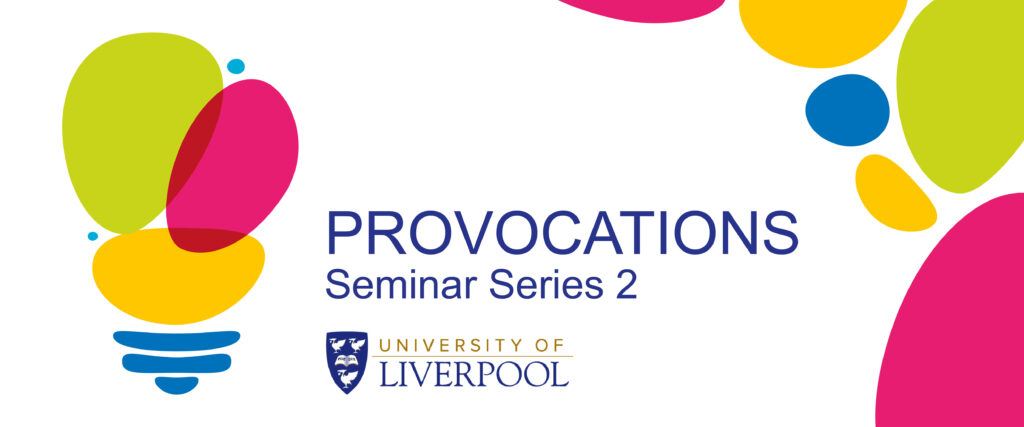Provocations Seminar Series 2

Following our successful Early Career Researcher Conference in March, we are inviting you to take part in a free programme of immersive workshops designed to start, or progress, your thinking about your own researcher journey.
In partnership with the University of Liverpool, NHS R&D North West is pleased to announce the launch of the second series of the highly successful Provocations Programme.
Provocations is a programme designed to enable you to participate in active dialogues between academic researchers from the University of Liverpool and health and care practitioners. The themes we are exploring in series two relate to several current health and care matters including the built environment, creative responses to historical medical racism, menopause and understanding frailty from a clinical and social perspective to name but a few of the themes that we will cover.
Provocations is only the start of the conversation and from each of the sessions there will be an opportunity for you to explore the theme further with the researcher in structured action learning sets designed to help inform development of practice and policy in health and care settings.
The sessions are designed and delivered in such a way as to ensure that you can utilise the time you spend participating as a contribution to your professional CPD requirements. They last approximately 2 hours, they will be held online 12-2pm. Attendance Certificates will be issued by NHS R&D NW to show the CPD outcomes and benefits of each session and follow on activity.
Numbers for the sessions are limited and the series will run monthly from May to December 2024 inclusive. Please book early to avoid disappointment. We will let you know when each session is open for booking. We look forward to welcoming you at these workshops as you take your next steps on your research career pathway.
Events
This series has now ended.
Click on the title to expand and read more about the event, and check out the blogs below for further insights.
Insights from this series:
-
Understanding frailty as a clinical, social and existential situation: Insights from NHS R&D NW Provocation Seminar Series
On 12 March 2025, we concluded our Provocation Series 2 with a thought-provoking seminar exploring frailty through clinical, social, and existential…
-
Identifying and Mitigating Racialised Microaggressions in Health and Care: Building Equity and Empathy: Insights from Lilian Otaye-Ebede Provocation Seminar
In a thought-provoking seminar led by Professor Lilian Otaye-Ebede (PhD) on December 11, 2024, healthcare professionals, researchers, and policymakers gathered to discuss racial…
-
Reframing Menopause: Challenging Stereotypes and Shaping Understanding: Insights from Dr Elham Amini’s Provocation Seminar
On 23rd October 2024, Dr Elham Amini in “Reframing Menopause: Challenging Stereotypes and Shaping Understanding”, part of the Provocations Seminar Series 2 hosted by…
-
Cycle of Inequality to Cycle of Equality through Belief and Validation for People with Energy Limiting Conditions: Insights from Bethan Evans and Morag Rose Provocation Seminar
Cycle of Inequality to Cycle of Equality through Belief and Validation for People with Energy Limiting Conditions On September 11, 2024,…
-
Reimagining Staff Rest Areas in Healthcare: Insights from Dr. Christina Malathouni’s Provocation Event
In the demanding world of healthcare, the well-being of staff is paramount, yet often overlooked in the design and functionality of…
-
Provocations Seminar Series 2: Meet Dr. Christina Malathouni
Exploring the Intersection of “Health and the Built Environment” Join us for the second appointment of the Provocations Seminar Series 2,…
Visit our archive to view more info about the story of the Provocations Series.
Click here to view the Provocation Seminar Series Evaluation Participant Information
